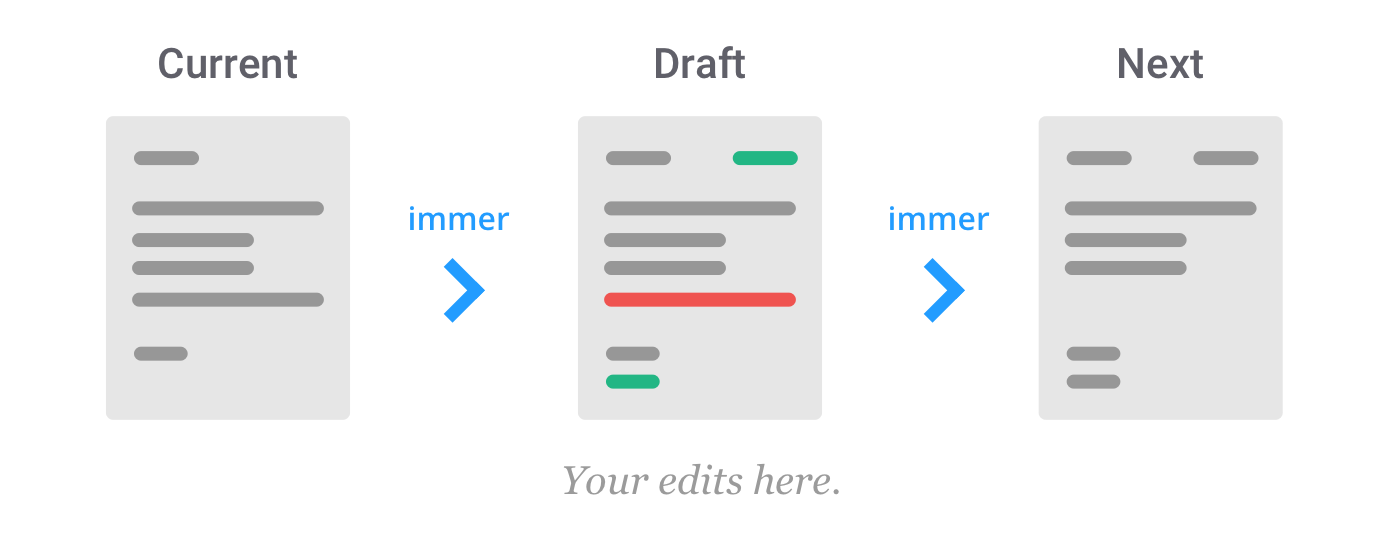一.简介
Immer (German for: always) is a tiny package that allows you to work with immutable state in a more convenient way.
Immer提供了一种更方便的不可变状态操作方式
二.核心优势
其方便之处主要体现在:
只有一个(核心)API:
produce(currentState, producer: (draftState) => void): nextState不引入额外的数据结构:没有 List、Map、Set 等任何自定义数据结构,因此也不需要特殊的相等性比较方法
数据操作完全基于类型:用纯原生 API 操作数据,符合直觉
例如:
const myStructure = {
a: [1, 2, 3],
b: 0
};
const copy = produce(myStructure, () => {
// nothings to do
});
const modified = produce(myStructure, myStructure => {
myStructure.a.push(4);
myStructure.b++;
});
copy === myStructure // true
modified !== myStructure // true
JSON.stringify(modified) === JSON.stringify({ a: [1, 2, 3, 4], b: 1 }) // true
JSON.stringify(myStructure) === JSON.stringify({ a: [1, 2, 3], b: 0 }) // true
比起Immutable提供的全套数据结构及其操作 API:
const { Map } = require('immutable');
const originalMap = Map({ a: 1, b: 2, c: 3 });
const updatedMap = originalMap.set('b', 1000);
// New instance, leaving the original immutable.
updatedMap !== originalMap;
const anotherUpdatedMap = originalMap.set('b', 1000);
// Despite both the results of the same operation, each created a new reference.
anotherUpdatedMap !== updatedMap;
// However the two are value equal.
anotherUpdatedMap.equals(updatedMap);
Immer 显得太过简洁
三.实现原理
两个关键点:Copy-on-write 与 Proxy
Copy-on-write
概念
Copy-on-write (CoW or COW), sometimes referred to as implicit sharing or shadowing, is a resource-management technique used in computer programming to efficiently implement a “duplicate” or “copy” operation on modifiable resources.
写时复制(copy-on-write,简称 CoW 或 COW),也叫隐式共享(implicit sharing)或隐藏(shadowing),是计算机编程中的一种资源管理技术,用于高效地复制或拷贝可修改资源
If a resource is duplicated but not modified, it is not necessary to create a new resource; the resource can be shared between the copy and the original. Modifications must still create a copy, hence the technique: the copy operation is deferred to the first write. By sharing resources in this way, it is possible to significantly reduce the resource consumption of unmodified copies, while adding a small overhead to resource-modifying operations.
具体的,如果复制了一个资源但没有改动,就没必要创建这个新的资源,此时副本能够与原版共享同一资源,在修改时仍需要创建副本。因此,关键在于:将拷贝操作推迟到第一次写入的时候。通过这种方式来共享资源,能够显著减少无改动副本的资源消耗,而只是略微增加了资源修改操作的开销
应用
COW 策略主要应用在以下几方面:
虚拟内存管理:进程共享虚拟内存、fork()系统调用等
存储:逻辑卷管理、文件系统、数据库快照
编程语言:PHP、Qt 中的许多数据类型
数据结构:实现不可变的数据结构,如状态树
以 fork()系统调用为例:

通过 COW 机制来实现进程间的内存共享,按需拷贝
Immer 与 Copy-on-write
在 Immer 中,Copy-on-write 机制用来解决拷贝数据结构产生的性能负担,如下图:

只在数据发生改变(write)时才拷贝数据结构(copy),否则共享同一个,因此:
copy === myStructure // true
modified !== myStructure // true
Proxy
Proxy 提供了一种 Hook 原生数据操作 API 的方式,例如:
const data = { a: 1 };
const proxy = new Proxy(data, {
set(target, key, value, receiver) {
console.log(`Set key = ${key}, value = ${value}`);
return Reflect.set(target, key, value, receiver);
}
});
proxy.a = 2;
// 输出 Set key = a, value = 2
data.a === 2 // true
不仅能够监听到数据变化,还允许进行操作拦截、甚至重定向:
const data = { a: 1 };
const copy = {};
const p = new Proxy(data, {
set(target, key, value, receiver) {
// 不写回data
// return Reflect.set(target, key, value, receiver);
// 全都写到copy上
Reflect.set(copy, key, value, copy);
}
});
p.a = 2;
data.a === 1 // true
copy.a === 2 // true
发现了什么?
data就这样成为了不可变的数据结构
P.S.关于 Proxy 语法及应用场景的更多信息,见proxy(代理机制)_ES6 笔记 9
Copy-on-write + Proxy
回到最初的示例:
const modified = produce(myStructure, myStructure => {
myStructure.a.push(4);
myStructure.b++;
});
我们试着将 Proxy 与 Copy-on-write 通过魔法融为一体:
function produce(data, producer) {
let copy;
const copyOnWrite = value => {
copy = Object.assign({}, value);
};
const proxy = new Proxy(data, {
set(target, key, value, receiver) {
// 写时复制
!copy && copyOnWrite(data);
// 全都写到copy上
Reflect.set(copy, key, value, copy);
}
});
producer(proxy);
return copy || data;
}
P.S.注意,这里提供的produce实现仅用来说明 Immer 原理,存在浅显的 bug,不具有实用价值
就得到了核心 API produce:
produce(currentState, producer: (draftState) => void): nextState
在 Immer 中,data之上的proxy被称为 Draft(草稿):

非常形象,在草稿上的修改(即对draftState的修改,会按 Copy-on-write 机制拷贝)不影响源数据,草稿完成(即producer执行完毕)之后,按照草稿对源数据打补丁,得到新数据
很巧妙的设计,就像 Photoshop 中的图层操作:
打开图片
新建图层,在新图层上涂涂抹抹
合并图层